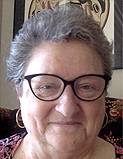Honorary Members

AERF 2017 Honorary Member
Dr. Marlene R. Atleo
Program Planning Co-Chair
Marlene R. Atleo, is a Senior Scholar, retired Associate Professor, in the Faculty of Education at the University of Manitoba. ?eh ?eh naa-tuu-kwiss (Ahousaht First Nation, Nuuchahnulth) teaches Aboriginal and Cross-Cultural Education in the Bachelor of Education program, and Adult and Post-Secondary Education in graduate studies for the MEd and PhD programs. Recently she facilitated the successful Master of Education process of two Red River College (Winnipeg, MB) Instructor Cohorts. Her graduates over the scant 15 years since 2004 number more than 80. Graduate teaching and mentoring have been a special delight for Dr. Atleo to meet the needs and opportunities in the teaching of adults in cross cultural and Indigenous professional contexts at all levels of education.
Her first love is traditional ways of putting-food-by such as salmon smoking/doing home-status-use fish. Then in the salmon industry, briefly as a fisher, a troller; then fish grader on the dock, a tally wo/man at the Queen Charlotte Cannery; herring roe popper; accounting clerk at the Canadian Fish Co.; costing clerk in the smoke house and fresh and frozen inventory ledger and sales at BC Packers Rupert Brand, on Campbell Avenue Docks. In the mid 80s, as ?eh ?eh naa tuu kwiss became a grandmother, it was clear that a time to retool had come. The fishing industry was shrinking and new Indigenous youth, like my grandson, would need fresh vistas of economic opportunity to explore. Marlene returned to post secondary education at UBC to finish a Bachelor of Human Ecology in Family Science - Resource Management and a Masters in Family Science, value and commitment to social roles and planning for the future for Indigenous people by Indigenous people.
Marlene became a community researcher, workshop facilitator, curriculum developer as partner in UMEEK HRD Inc. UMEEK was an Indigenous owned and operated, private post secondary institution that supported welfare to work programming through adult learning re-orientation for underserved populations who were leaving or retooling in the fishing industry as that economy and occupational standards changed. This trajectory brought her back to Ahousaht the home reserve where there was an opportunity to support the articulation of a social justice initiative then called the Ahousaht Wholistic Society modelled after Hollow Water in the community to serve the community. Marlene spent two years there to develop the infrastructure, conduct funded research, the work with the local tribal council on continued infrastructure and human resource development programming in nursing. It soon became clear to Atleo that the wicked problems that Ahousaht faced structurally were not easily remediable. Marlene, in fact, did not have words for some of the issues she knew needed to be articulated for problem analysis. Her response was to return to graduate school to investigate the sources and development of intergenerational human capital in relationship to learning and teaching, how it was transformed and transmitted in adulthood and not just culturally transmitted. She looked back at storywork, traditional narratives of learning at important junctures with elders from the community.
Policy and processes around adult learning support during economic restructuring became of central interest for Dr. Atleo with respect to re-schooling of adult and underserved populations leading the way from community programming at North Island College on Vancouver Island where the remote First Nations communities could be served on line or by a travelling instructor to meet community programming needs. Subsequently, between 2004 and now, Marlene has been actively engaged in the Faculty of Education in Manitoba. Her research focus is on cross cultural/Aboriginal/adult learning for post-secondary education across the disciplines during structural shifts in society and economy. With Laara Fitznor, Dr. Atleo has worked on an Aboriginal SSHRC initiative looking at Indigenous heritage language and educational success. She led a group researching blended learning as a technical pedagogy in the classroom in anticipation of increased technology in the delivery of programming. Marlene has travelled extensively to deliver conference papers (Throughout Canada and the USA; Umea, Sweden; Cairns, Australia; The Pas, Manitoba; Leeds, UK; Katowice, Poland; Trier, Germany, etc). Keynotes included the Canadian Society for the Study of Education presentation in Fredericton, NB; Association for Community Colleges in Saskatoon Sask.; Language Learning in Winnipeg Manitoba; Indigenous Protocols for Health at UVIC, to name a few. Recognition for her work has including the prestigious Thomas Greenfield Award from the Canadian Association for the Study of Educational Administration, fellowships in Germany (Greifswald, GE) and British Columbia (University of the Fraser Valley, Chilliwack, BC; Vancouver Island University, Nanaimo, B.C.). The Research Award from the Manitoba Education Research Network, Lifelong Membership in Shawane Dagosiwin - Manitoba Indigenous Research Conference (2004 - present) and recently the Migizii Award from the Aboriginal Students at the University of Manitoba. Currently, Marlene is living in the mild climate of Sardis, B.C.; surrounded by grandchildren, writing, writing, writing, and expecting to fill her freezer this year with the 100 Mile bounty of the Fraser Valley in British Columbia Canada. We honour Marlene’s contributions to the Aboriginal Education Research Forum as an Honorary Member.
